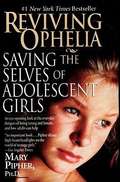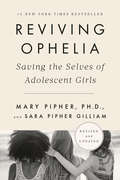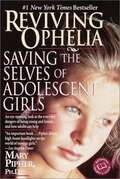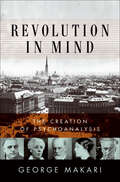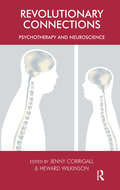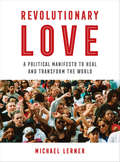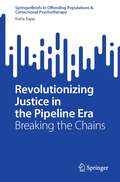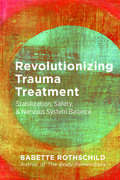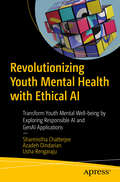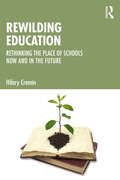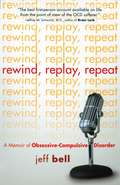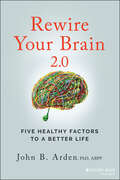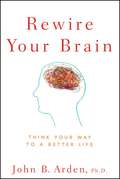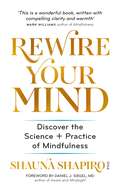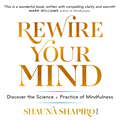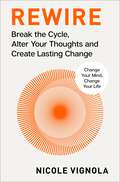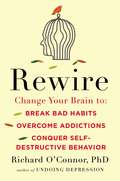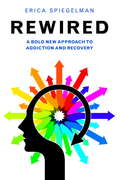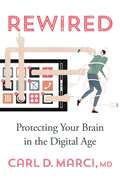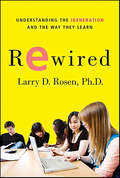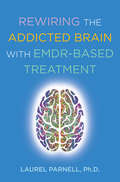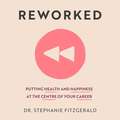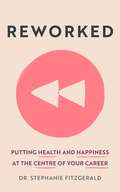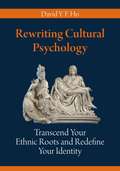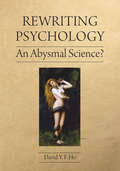- Table View
- List View
Reviving Ophelia
by Mary PipherTHREE YEARS ON THENEW YORK TIMESBESTSELLER LIST AND MORE THAN 1. 5 MILLION COPIES SOLD WhenReviving Opheliawas first published nearly a decade ago, the response was extraordinary–and Dr. Mary Pipher became one of the most sought-after speakers in the country. She posed the provocative question: Why are American adolescent girls falling prey to depression, eating disorders, and suicide attempts at an alarming rate? The answer hit a nerve. We live in a look-obsessed, sexist “girl-poisoning” culture. And despite the advances of feminism, girls continue to struggle to find their true selves. Here are girls’ unmuted voices from the front lines of adolescence, personal and painfully honest. By laying bare their harsh day-to-day reality,Reviving Opheliaissues a call to arms and offers parents compassion, strength, and strategies with which to revive these Ophelias’ lost sense of self.
Reviving Ophelia 25th Anniversary Edition: Saving the Selves of Adolescent Girls
by Mary Pipher Sara GilliamThe 25th anniversary edition of the iconic book, revised and updated for 21st-century adolescent girls and their families.In 1994, Reviving Ophelia was published, and it shone a much-needed spotlight on the problems faced by adolescent girls. The book became iconic and helped to reframe the national conversation about what author Mary Pipher called "a girl-poisoning culture" surrounding adolescents. Fast forward to today, and adolescent girls and the parents, teachers, and counselors who care about them find themselves confronting many of the same challenges Pipher wrote about originally as well as new ones specific to today.Girls still struggle with misogyny, sexism, and issues of identity and self-esteem. But they're also more isolated than ever before: They don't talk face-to-face to the people around them, including their peers, as they used to: They're texting or on social media for hours at a time. And while girls today are less likely to be in trouble for their drinking or sexual behavior, they have a greater chance of becoming depressed, anxious, or suicidal.In this revised and updated Reviving Ophelia, Pipher and her daughter, Sara Pipher Gilliam (who was a teenager at the time of the book's original publication), have incorporated these new issues for a 21st-century readership. In addition to examining the impact that social media has on adolescent girls' lives today, Pipher and Gilliam explore the rising and empowering importance of student activism in girls' lives, the wider acceptance of diverse communities among young people, and the growing disparities between urban and rural, rich and poor, and how they can affect young girls' sense of self-worth. With a new foreword and afterword and chapters that explore these topics, this new edition of Reviving Ophelia builds on the relevance of the original as it provides key insights into the challenges and opportunities facing adolescent girls today.The approach Pipher and Gilliam take in the new edition is just what it was in the original: a timely, readable combination of insightful research and real-world examples that illuminate the challenges young women face and the ways to address them. This updated Reviving Ophelia looks at 21st century adolescent girls through fresh eyes, with insights and ideas that will help new generations of readers.
Reviving Ophelia: Saving the Selves of Adolescent Girls
by Mary PipherWhy are more American adolescent girls prey to depression, eating disorders, addictions, and suicide attempts than ever before? According to Dr. Mary Pipher, a clinical psychologist who has treated girls from more than twenty years, we live in a look-obsessed, media saturated, "girl-poisoning" culture. Despite the advance of feminism, escalating levels of sexism an violence, cause girls to stifle their creative spirit and natural impulses which, ultimately, destroy their self-esteem. Yet girls often blame themselves or their families for this "problem with no name" instead of looking at the world around them.
Revolution in Mind: The Creation of Psychoanalysis
by George MakariA masterful history of one of the most important movements of our time, Revolution in Mind is a brilliant, engaging, and radically new work—the first ever to fully account for the making of psychoanalysis. In a sweeping narrative, George Makari demonstrates how a new way of thinking about inner life coalesced and won followers who spread this body of thought throughout the West. Along the way he introduces the reader to a fascinating array of characters, many of whom have been long ignored or forgotten.Amid great ferment, Sigmund Freud emerged as a creative, interdisciplinary thinker who devised a riveting new theory of the mind that attracted acolytes from the very fields the Viennese doctor had mined for his synthesis. These allies included Eugen Bleuler, Carl Jung, and Alfred Adler, all of whom eventually broke away and accused the Freudian community of being unscientific. Makari reveals how in the wake of these crises, innovators like Sándor Ferenczi, Wilhelm Reich, Melanie Klein, and others reformed psychoanalysis, which began to gain wide acceptance only to be banished from the continent and sent into exile due to the rise of fascism.Groundbreaking, insightful, and compulsively readable, Revolution in Mind goes beyond myth and polemic to give us the story of one of the most controversial intellectual endeavors of the twentieth century.
Revolutionary Connections: Psychotherapy and Neuroscience (The\united Kingdom Council For Psychotherapy Ser.)
by Heward Wilkinson Jenny CorrigallFor many years psychotherapy and neuroscience have been estranged, existing on opposite ends of the spectrum concerned with the investigation of the mind. However, in recent years, these two opposing schools of thought have found their paths converging so that now a mutually rewarding relationship is taking its first steps towards greater co-operation and understanding. The UKCP conference was one such step. Leading experts in affective neuroscience and psychotherapy attended and gave lectures that integrated material and theories from a number of fields on diverse subjects such as infant development and the relationship between emotion and consciousness. These talks highlighted the benefit of greater contact between these fields, with practical examples as well as theoretical. This innovative collection is one of the first to emphasise and demonstrate the value of greater unity and is an essential introduction for all to this burgeoning area of research.
Revolutionary Love: A Political Manifesto to Heal and Transform the World
by Michael LernerFrom social theorist and psychotherapist Rabbi Michael Lerner comes a strategy for a new socialism built on love, kindness, and compassion for one another. Revolutionary Love proposes a method to replace what Lerner terms the “capitalist globalization of selfishness” with a globalization of generosity, prophetic empathy, and environmental sanity.Lerner challenges liberal and progressive forces to move beyond often weak-kneed and visionless politics to build instead a movement that can reverse the environmental destructiveness and social injustice caused by the relentless pursuit of economic growth and profits. Revisiting the hidden injuries of class, Lerner shows that much of the suffering in our society—including most of its addictions and the growing embrace of right-wing nationalism and reactionary versions of fundamentalism—is driven by frustrated needs for community, love, respect, and connection to a higher purpose in life. Yet these needs are too often missing from liberal discourse. No matter that progressive programs are smartly constructed—they cannot be achieved unless they speak to the heart and address the pain so many people experience.Liberals and progressives need coherent alternatives to capitalism, but previous visions of socialism do not address the yearning for anything beyond material benefits. Inspired by Herbert Marcuse, Erich Fromm, and Carol Gilligan, Revolutionary Love offers a strategy to create the “Caring Society.” Lerner details how a civilization infused with love could put an end to global poverty, homelessness, and hunger, while democratizing the economy, shifting to a twenty-eight-hour work week, and saving the life-support system of Earth. He asks that we develop the courage to stop listening to those who tell us that fundamental social transformation is “unrealistic.”
Revolutionizing Justice in the Pipeline Era: Breaking the Chains (SpringerBriefs in Offending Populations & Correctional Psychotherapy)
by Karla SappThis thought-provoking and timely book focuses on the pressing issues surrounding criminal justice and policy reform through the examination of flaws and biases within the criminal justice system. It highlights the disproportionate incarceration rates faced by marginalized individuals and the far-reaching consequences for families and communities. The heart of the book lies in the dismantling of the pipelines to prisons. It explores the systemic factors that contribute to the pipelines, including issues surrounding school, educational, child welfare, and foster care policies. By shedding light on how these policies can funnel individuals into the criminal justice system, the book underscores the importance of addressing root causes and offering alternative pathways. Drawing on restorative justice principles, the book advocates for a transformative approach that promotes repairing harm, healing, and rebuilding relationships. It explores successful restorative justice practices and progress that have yielded positive results for both victims and offenders. Throughout, the book emphasizes the need for comprehensive policy reform in order to effect lasting change. It analyzes existing policies, identifying areas for improvement and advocating for a shift towards equitable, just, and human-centered approaches. Lastly, the book aims to inspire readers to engage in meaningful discussions, advocate for policy reform, and support restorative justice practices, with the vision of a future in which justice is not just punitive, but also healing, transformative, and imbued with a sense of fairness for all. This book is best suited for upper-level undergraduates, graduate students and researchers, and practitioners in criminal justice fields and mental health professions working with offender populations.
Revolutionizing Trauma Treatment: Stabilization, Safety, And Nervous System Balance
by Babette RothschildChallenges the notion that clients with PTSD must revisit, review, and process their memories to recover from trauma. Being able to monitor and modulate a trauma client’s dysregulated nervous system is one of the practitioner’s best lines of defense against traumatic hyperarousal going amok—risking consequences such as dissociation and decompensation. This paperback edition of Babette Rothschild’s The Body Remembers, Volume 2, clarifies and simplifies autonomic nervous system (ANS) understanding and observation. It includes a full-color table that distinguishes six levels of arousal, which has proven to be an essential clinical tool, presenting a new and useful distinction between trauma-induced hypoarousal and the low arousal that is caused by lethargy or depression. Multiple therapeutic transcripts illuminate key points in trauma treatment, including stabilizing clients who dissociate, identifying and implementing hidden somatic resources, and utilizing good memories and somatic markers. With an authoritative yet personal voice, Rothschild’s book is essential reading for anyone working with those who have experienced trauma. The full-color ANS table is also available separately as a laminated desk reference card.
Revolutionizing Youth Mental Health with Ethical AI: Transform Youth Mental Well-being by Exploring Responsible AI and GenAI Applications
by Sharmistha Chatterjee Azadeh Dindarian Usha RengarajuThis book is your comprehensive guide into the dynamic intersection of artificial intelligence (AI) and youth mental health. It aims to bridge the gap between cutting-edge AI technology and its transformative potential in addressing youth mental health challenges. The book's content is structured into three key parts, each focusing on different facets of AI applications in youth mental health. The first part provides a comprehensive background on the current state of youth mental health, analyzing the prevalence of mental health issues and identifying the unique challenges faced by the digital generation. In the second part, we explore the foundational principles of AI and its potential for revolutionizing mental health care, including natural language processing, machine learning, and predictive analytics. In this section, you will find in-depth case studies and real-world applications that showcase how AI-driven interventions have already transformed mental health care for youth across diverse contexts. Finally, the third part delves into ethical considerations, fairness, privacy concerns, and the responsible integration of AI in youth mental health care to design long-term sustainable solutions. This book offers a unique and holistic perspective, making it an indispensable resource for anyone passionate about leveraging AI for the betterment of youth mental health. Through this book, you will gain the knowledge and tools needed to design and implement effective AI-driven solutions that have the potential to transform the mental health landscape for the benefit of future generations. What You Will Learn Understand the current state of youth mental health, exploring the prevalence of mental health issues among the digital generation Understand natural language processing, machine learning, and predictive analytics Know how AI interventions are already transforming mental health care for youth in diverse contexts Be aware of fairness, privacy concerns, and the responsible integration of AI in youth mental health care Get familiar with the role of GenAI in the mental health domain and how AI agents can be a game-changer Who This Book Is For To equip academics and researchers in the AI, computer science, and digital mental health domain as well as AI application developers with a deeper understanding of how AI-powered innovations can enhance the well-being of youth; and innovation managers and policymakers who are interested in exploring the AI use cases
Rewilding Education: Rethinking the Place of Schools Now and in the Future
by Hilary CreminRewilding Education calls for a radical, system-wide reinvention of education as an adaptable ecosystem; less predictable and measurable, but far more suitable for shaping the adults of tomorrow.By encouraging us to transform how we think about education in what is left of the twenty-first century, Hilary Cremin connects directly with educators, parents, young people and policymakers to share a vision for healthy education settings and societies that nurture both human flourishing and sustainable ecosystems. Full of ideas about what rewilding might look like when applied to education, Hilary Cremin evidences how education has been, and can be, successfully rewilded in schools and classrooms, including case studies from unexpected places like Kerala in India, where literacy rates exceed those in the United States.By combining academic research, poetry and examples from around the world, the book will inspire the next generation of educators, decision-makers and families to take practical steps towards the education our children need and deserve.
Rewind Replay Repeat: A Memoir of Obsessive Compulsive Disorder
by Jeff BellThe revealing story of one man's struggle with obsessive-compulsive disorder (OCD) and his hard-won recovery.Rewind, Replay, Repeat is the revealing story of Jeff Bell's struggle with obsessive-compulsive disorder (OCD) and his hard-won recovery. Nagging doubt: It's a part of everyday life. Who hasn't doubled back to check on a door or appliance? But what if one check wasn't enough? Nor two or three? And what if nagging doubt grew so intense that physical senses became all but useless? Such was the case for Bell, a husband, father, and highly successful radio news anchor--and one of the millions of Americans living with obsessive-compulsive disorder (OCD). His fascinating memoir recounts the depths to which this debilitating anxiety disorder reduced him--to driving his car in continuous circles, scouring his hands in scalding water, and endlessly rewinding, replaying, and repeating in his head even the most mundane daily experiences. Readers will learn what OCD feels like from the inside, and how healing from such a devastating condition is possible through therapy, determination, and the support of loved ones.
Rewire Your Brain 2.0: Five Healthy Factors to a Better Life
by John B. ArdenCombat daily stressors and live your life to its fullest In the newly revised Rewire Your Brain 2.0: Five Healthy Factors to a Better Life, distinguished psychologist Dr. John B. Arden delivers an essential discussion of how to apply the latest developments in neuroscience, epigenetics, and immunology to help improve your mood, memory, lives, longevity, and relationships. You’ll learn to overcome mild depression and anxiety, procrastination, burnout, compassion fatigue, and a variety of other negative thought patterns. You’ll also find: Practical, self-help tips based on well-researched principles that are proven to work in the real world Ways to minimize the impact of everyday anxiety, stress, and depression and live your life to its fullest Tactics for improving your memory for day-to-day tasks at work and at homeA practical and hands-on roadmap to applying new advances in neuroscience, psychology, gene expression, and immune system research to everyday problems we all face, Rewire Your Brain 2.0 deserves a place on the bookshelves of professionals, athletes, parents, and anyone else susceptible to the stressors of daily life.
Rewire Your Brain: Think Your Way to a Better Life
by John B. ArdenHow to rewire your brain to improve virtually every aspect of your life-based on the latest research in neuroscience and psychology on neuroplasticity and evidence-based practices Not long ago, it was thought that the brain you were born with was the brain you would die with, and that the brain cells you had at birth were the most you would ever possess. Your brain was thought to be "hardwired" to function in predetermined ways. It turns out that's not true. Your brain is not hardwired, it's "softwired" by experience. This book shows you how you can rewire parts of the brain to feel more positive about your life, remain calm during stressful times, and improve your social relationships. Written by a leader in the field of Brain-Based Therapy, it teaches you how to activate the parts of your brain that have been underactivated and calm down those areas that have been hyperactivated so that you feel positive about your life and remain calm during stressful times. You will also learn to improve your memory, boost your mood, have better relationships, and get a good night sleep. Reveals how cutting-edge developments in neuroscience, and evidence-based practices can be used to improve your everyday life Other titles by Dr. Arden include: Brain-Based Therapy-Adult, Brain-Based Therapy-Child, Improving Your Memory For Dummies and Heal Your Anxiety Workbook Dr. Arden is a leader in integrating the new developments in neuroscience with psychotherapy and Director of Training in Mental Health for Kaiser Permanente for the Northern California Region Explaining exciting new developments in neuroscience and their applications to daily living, Rewire Your Brain will guide you through the process of changing your brain so you can change your life and be free of self-imposed limitations.
Rewire Your Mind: Discover the science and practice of mindfulness
by Dr Shauna Shapiro'This is a wonderful book, written with compelling clarity and warmth. Shauna Shapiro is known internationally for her outstanding contribution to research and clinical work on the very frontier of the mindfulness field. She is one those rare scientist-practitioners who contribute not only new methods but new and deeper understandings of mind - its challenges and its potential' - Mark Williams, Emeritus Professor of Clinical Psychology, University of Oxford, and author of international bestseller Mindfulness: A practical guide to finding peace in a frantic worldWeaving together ancient wisdom and scientific research, Dr Shauna Shapiro formulates the most potent practices for living a happy, meaningful life. Individually, these practices will help you sculpt neuropathways of clarity and calm. Collectively, they will help us live in a more connected, compassionate world. The practice of mindfulness works. It's good for you. It strengthens immune function, reduces stress, improves sleep, and offers countless other benefits. It primes the mind for joy, it creates a roadmap for strengthening the brain's circuitry of deep calm, contentment and clarity. Dr Shapiro offers the science and the practice of mindfulness, showing the reader how to rewire and rebalance their own individual negativitiy bias, create new pathways for curiosity, joy and focused attention. This is ultimate training for the monkey mind.
Rewire Your Mind: Discover the science and practice of mindfulness
by Dr Shauna ShapiroWeaving together ancient wisdom and scientific research, Dr Shauna Shapiro formulates the most potent practices for living a happy, meaningful life. Individually, these practices will help you sculpt neuropathways of clarity and calm. Collectively, they will help us live in a more connected, compassionate world. The practice of mindfulness works. It's good for you. It strengthens immune function, reduces stress, improves sleep, and offers countless other benefits. It primes the mind for joy, it creates a roadmap for strengthening the brain's circuitry of deep calm, contentment and clarity. Dr Shapiro offers the science and the practice of mindfulness, showing the listener how to rewire and rebalance their own individual negativity bias, create new pathways for curiosity, joy and focused attention. This is ultimate training for the monkey mind. 'Shauna Shapiro is known internationally for her outstanding contribution to research and clinical work on the very frontier of the mindfulness field. She is one those rare scientist-practitioners who contribute not only new methods but new and deeper understandings of mind - its challenges and its potential' - Mark Williams, Emeritus Professor of Clinical Psychology, University of Oxford, and author of international bestseller Mindfulness: A practical guide to finding peace in a frantic world(p) 2020 Octopus Publishing Group
Rewire: Break the Cycle, Alter Your Thoughts and Create Lasting Change (Your Neurotoolkit for Everyday Life)
by Nicole VignolaChange your mind to change your life—discover the neuroscience of a better you in this revolutionary book from neuroscientist and online sensation Nicole Vignola that teaches you how to rewire your brain to achieve peak mental wellbeing.Are you stuck in a habit of believing you are not good enough?Do you fixate on a particular story about yourself that you wish you could change?Are negative beliefs holding you back from reaching your fullest potential?Do you sometimes feel like it’s just too hard, or too late, to change?If any of this sounds familiar, you need Rewire, your personal guide to understanding the neuroscience of why you are subconsciously programmed to repeat certain habits and how you can do, or undo, any type of behavior to be the person you want to be.BREAK THE CYCLE, ALTER YOUR THOUGHTS AND CREATE LASTING CHANGEIn clear language, neuroscientist Nicole Vignola demystifies the science of breaking bad habits and how to make good ones, the principles of neuroplasticity, and neurohack methods for changing behavioral patterns. In the end, she helps you to see yourself in a different way and control how you react to any life situation, from overcoming negative, limiting beliefs to managing stress and achieving peak mental wellbeing.Think of your brain as your hardware and your mental health as your software. Your hardware must work well before you can upgrade your software; Once you learn the fundamentals of rewiring your brain, you can instill new habits, shift your mindset, and change unwanted behavior to create the best version of yourself.We all have habits and behaviors that hold us back from reaching our fullest potential. This book will help you see that you are not stuck, that you can rewrite your story—and shows you how.
Rewire: Change Your Brain to Break Bad Habits, Overcome Addictions, Conquer Self-Destructive Behavior
by Richard O'ConnorWe humans tend to get in our own way time and time again--whether it comes to not speaking up for ourselves, going back to bad romantic partners, dieting for the umpteenth try, or acting on any of a range of bad habits we just can't seem to shake. In Rewire, renowned psychotherapist Richard O'Connor, PhD, reveals exactly why our bad habits die so hard. We have two brains--one a thoughtful, conscious, deliberative self, and the other an automatic self that makes most of our decisions without our attention. Using new research and knowledge about how the brain works, the book clears a path to lasting, effective change for behaviors that include: Procrastination Overeating Chronic disorganization Staying in bad situations Excessive worrying Risk taking Passive aggression Self-medication Bringing together many different fields in psychology and brain science, Dr. O'Connor gives you a road map to overcoming whatever self-destructive habits are plaguing you, with exercises throughout the book. We can rewire our brains to develop healthier circuitry, training the automatic self to make wiser decisions without having to think about it; ignore distractions; withstand temptations; see ourselves and the world more clearly; and interrupt our reflexive responses before they get us in trouble. Meanwhile, our conscious minds will be freed to view ourselves with compassion at the same time as we practice self-discipline. By learning valuable skills and habits--including mindfulness, self-control, confronting fear, and freeing yourself from mindless guilt--we can open ourselves to vastly more successful, productive, and happy lives. The book even demystifies how to overcome what Dr. O'Connor calls the "undertow" (the mysterious force that sabotages our best efforts when we're just on the edge of victory) for long-lasting change. Offering a valuable science-based new paradigm for rewiring our brains, Rewire is a refreshing guide to becoming a healthier, happier self.
Rewired
by Erica SpiegelmanA REVOLUTIONARY NEW APPROACH TO ADDICTION RECOVERY FROM AN ADDICTION EXPERT Rewired is a new, breakthrough approach to fighting addiction and self-damaging behavior by acknowledging our personal power to bring ourselves back from the brink. Centered on the concept of self-actualization, Rewired will guide you towards not only physical sobriety, but a mental, emotional, and spiritual sobriety by learning to identify key principles within yourself, including authenticity, honesty, gratitude, and understanding a need for solitude. Rewired addresses the whole self; just as addiction affects every part of one's life, so too must its treatment. By helping us to build a healthy space to support our own recovery, we can rewrite the negative behaviors that result in addiction. Usable in conjunction with or in place of 12-step programs, Rewired allows for a more holistic approach, helping to create a personalized treatment plan that is right for you. Each section in Rewired includes: - Personal anecdotes from the author's own struggles with alcoholism and addiction - Inspiring true success stories of patients overcoming their addictions - Questions to engage you into finding what is missing from your recovery - Positive affirmations and intentions to guide and motivate With all the variables, both physical and emotional, that play into overcoming addiction, Rewired enables us to stay strong and positive as we progress on the path to recovery. Rewired teaches patience and compassion, the two cornerstones of a new, humanist approach to curing addiction. Remember, addicts are not broken people that need to be fixed--they just have a few crossed wires.From the Trade Paperback edition.
Rewired: Protecting Your Brain in the Digital Age
by Carl D. MarciLiving in an age of digital distraction has wreaked havoc on our brains—but there’s much we can do to restore our tech–life balance. We live in a world that is always on, where everyone is always connected. But we feel increasingly disconnected. Why? The answer lies in our brains. Carl D. Marci, MD, a leading expert on social and consumer neuroscience, reviews the mounting evidence that overuse of smart phones and social media is rewiring our brains, resulting in a losing deal: we are neglecting the relationships that sustain us and keep us healthy in favor of weaker and more ephemeral ties. The ability to connect and form strong social bonds is fundamental to human experience and emerged through unique structures in our brains. But ever-more-powerful technologies and ubiquitous access to media have hijacked our need to connect intimately and emotionally with others. The quick highs of clicking “like” and swiping right overstimulate the same neurological reward centers associated with social relationships. The habits that accompany our digital lifestyles are putting tremendous pressure on critical components of the brain associated with attention, emotion, and memory, changing how we process information and altering how we communicate and relate, even at a physiological level. As a psychiatrist working at the forefront of research on the impact of digital technology, Marci has seen this transformation up close and developed a range of responses. Rewired provides scientifically supported solutions for everyone who wants to restore their tech–life balance—from parents concerned about their children’s exposure to the internet to stressed workers dealing with the deluge of emails and managing the expectation of 24/7 availability.
Rewired: Understanding the iGeneration and the Way They Learn
by Larry Rosen“This book offers insight and help to motivate and maximize learning for the Internet Generation”—from the coauthor of The Distracted Mind (Eric Milou, Professor of Mathematics, Rowan University).Look around at today's youth and you can see how technology has changed their lives. They lie on their beds and study while texting and chatting online with friends and scrolling through TikTok. How does the new, charged-up, multitasking generation respond to traditional textbooks and lectures? Are we effectively reaching today's technologically advanced youth? Rewired is the first book to help educators and parents teach to this new generation's radically different learning styles and needs. This book will also help parents learn what to expect from their “techie” children concerning school, homework, and even socialization. In short, it is a book that exposes the impact of generational differences on learning while providing strategies for engaging students at school and at home.“Larry's research-based, positive, proactive messages are a welcome relief from the unsupported fear-based messages that are unfortunately also present. Rewired should be considered a ‘must-read' by all professionals who work with youth, especially those in leadership positions.” ―Nancy Willard Director of Center for Safe and Responsible Internet Use
Rewiring the Addicted Brain with EMDR-Based Treatment
by Laurel ParnellAttachment-focused EMDR and resource tapping applied to the clinical challenge of addictions recovery. Writing for both EMDR therapists and substance abuse counselors, Laurel Parnell provides user-friendly tools to help support clients in recovery with EMDR-based techniques that can be easily integrated into all levels of addiction treatment. Emphasizing the practical clinical application of principles and techniques helpful for addictions and addictive disorders, this book interweaves case material throughout the text, with some chapters presenting in-depth cases to illustrate the techniques. Topics include treating trauma and supporting resilience, tools for affect regulation, and rewiring the motivation-reward circuits.
Reworked: Putting Health and Happiness at the Centre of Your Career
by Stephanie FitzgeraldThis audiobook offers everyone struggling with Sunday night syndrome a practical path to happiness.We're raised to believe that we will have jobs and work. Our school system is designed in part to educate us so we can find a good job afterwards. Yet no-one ever tells you how to work. No one ever sits you down and tells you how to be at the centre of your work, how to get the most out of your role and how to be happy, healthy, safe and engaged in the workplace. Lacking this knowledge, work often veers off and feels wrong. Panicking, we change and start again somewhere else, thinking 'it's not me, it's the job'. And then the process begins again.In a post-COVID19 world where redundancies are high, and job opportunities are low, never has it been so essential to learn how to be happy and healthy at work. Literature advocating that you 'love it or leave it' is not applicable or helpful in a squeezed job-market. Not many have the privilege of being able to up and leave their job, and even if you do there is no guarantee of happiness if you don't know the rules or understand how to work well and be well at work.Unless you do the work, you can change jobs as often as you like but still never find the elusive happiness you seek. Jumping from job to job will not provide you with the answers, unless you can first rework yourself and shed yourself of the burden of inherited cultures, past beliefs and historical mistakes.Reworked utilises neuroscience, evidence-based psychology and two decades of working in health and wellbeing to teach you how to be happy, healthy, safe and engaged at work. These are the four key pillars which run throughout the audiobook. An audiobook to empower, inspire and ignite a passion for happiness at work, Reworked will teach you everything you need to rethink, reimagine and reinvent yourself, as you always wanted to be, in the workplace.(P)2023 Hodder & Stoughton Limited
Reworked: Putting Health and Happiness at the Centre of Your Career
by Stephanie FitzgeraldWe're raised to believe that we will have jobs and work. Our school system is designed in part to educate us so we can find a good job afterwards. Yet no-one ever tells you how to work. No one ever sits you down and tells you how to be at the centre of your work, how to get the most out of your role and how to be happy, healthy, safe and engaged in the workplace. Lacking this knowledge, work often veers off and feels wrong. Panicking, we change and start again somewhere else, thinking 'it's not me, it's the job'. And then the process begins again.In a post-COVID19 world where redundancies are high, and job opportunities are low, never has it been so essential to learn how to be happy and healthy at work. Literature advocating that you 'love it or leave it' is not applicable or helpful in a squeezed job-market. Not many have the privilege of being able to up and leave their job, and even if you do there is no guarantee of happiness if you don't know the rules or understand how to work well and be well at work.Unless you do the work, you can change jobs as often as you like but still never find the elusive happiness you seek. Jumping from job to job will not provide you with the answers, unless you can first rework yourself and shed yourself of the burden of inherited cultures, past beliefs and historical mistakes.Reworked utilises neuroscience, evidence-based psychology and two decades of working in health and wellbeing to teach you how to be happy, healthy, safe and engaged at work. These are the four key pillars which run throughout the book. A book to empower, inspire and ignite a passion for happiness at work, Reworked will teach you everything you need to rethink, reimagine and reinvent yourself, as you always wanted to be, in the workplace.
Rewriting Cultural Psychology: Transcend Your Ethnic Roots and Redefine Your Identity
by David Yau HoThis volume is addressed to scholars as well as a popular audience, aimed to bridge the gap between academia and the general public. It deals with 'who we are,' concerning our sense of self and identity; and 'how we live,' concerning our ways of life in d
Rewriting Psychology: An Abysmal Science?
by David Y. HoOf what use is psychology if it does not help to solve the pressing problems of the day at the individual and collective levels? This is no less a pointed question to the reader as it is to the author that sets the stage for an adventurous sharing of ideas. The author shies away from providing ready-made answers but spares no effort in stirring the reader to ponder questions about human nature and behavior. Soon, the reader will react with the exclamation, “Ah, this book is about me, useful to my life!” In this way, the book serves to bridge the gap between academia and the general public. As the reader may well expect, bold assertions may be found throughout this volume. For instance, Piaget’s stage of formal operations does not represent the final or highest level of cognitive development; rather, dialectical thinking is the apex of human cognition. Viewpoints may be controversial, such as cautioning against importing Confucian education into America; the possibility that madness may enrich your life; raising the question if Trump is immoral, mentally deranged, or both. The present offering is at once audacious and provocative: Having raised the question about the abysmal status of psychology, the author feels compelled to take on the challenge of rewriting an academic discipline. The reader is invited to consider new visions for psychology’s future development, both scientific and practical. Fresh materials or distinctive features seldom found elsewhere are presented: the author’s “secret thoughts” and self-revelations; a discussion on the birth of evil and reinterpretation of the fall of humankind. All these expand the traditional boundaries of psychology and bring it closer to be a science relevant to the human condition. WORDS OF PRAISE David Ho’s book is a long-awaited constructive critique of why psychology has not succeeded in becoming a real science. This book is a must-read for any young aspiring psychology student, East or West. Jaan Valsiner, Niels Bohr Professor of Cultural Psychology, Aalborg University; Foreign Member, Estonian Academy of Sciences. In his alarming book, David Ho demonstrates vividly and ardently that self-actualization, celebrated in Western psychology, is not more than an opiate of the mind as long as it is disconnected from societal problems and historical change. Hubert Hermans, Emeritus Professor, Catholic University of Nijmegen; creator of Dialogical Self Theory. Professor Ho has challenged psychologists to remove themselves from the slumber that has left them unaware of their lack of societal effectiveness. Duran Bell, Professor Emeritus, Economics and Anthropology, University of California, Irvine.
